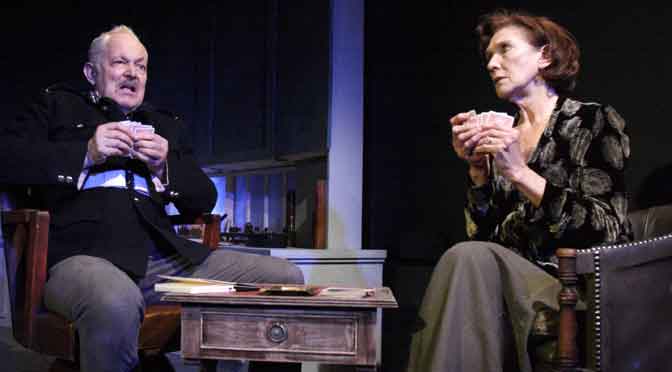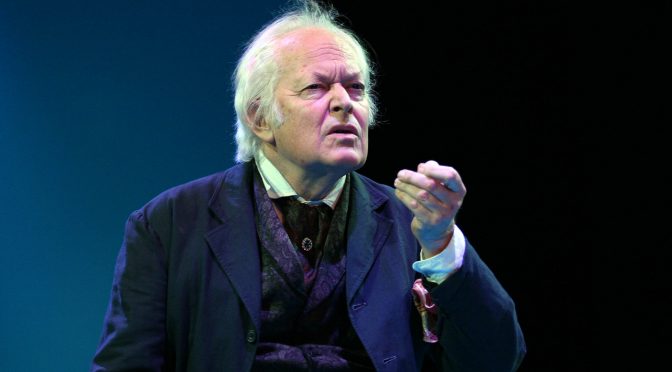Watching the intricacies of close relationships has an extra charge in the wonderful intimacy of the Gate Theatre. Opening last night, Dances of Death, shows us a marriage long disintegrated into a conjugal competition that is sure to provoke any audience. Howard Brenton’s new version of Strindberg’s influential classic condenses two plays into one evening to create a riveting night of theatre.
At first it seems as if we’re in for a comedy, as Edgar and his wife of 30 years, Alice, bluntly admit their misery, and settle down to a squabbling card game that neither enjoys – they have other games to play of a more sinister kind. Forced to join them is Kurt (Christopher Ravenscroft), whose crime of being matchmaker to the pair is something they have never forgiven him for.
Michael Pennington and Linda Marlowe establish the main characters with skilful speed. Their continuing contest is convincing, despite obscure motivations and bizarre behaviour. Pennington is marvellous at the captain of a military camp on a remote island; an impressive fabulator, rolling his eyes in a drunken stupor, and a boorish bully with a mischievous edge. Best of all, his depiction of physical illness is superb. Marlowe has a harder task, with a more ambiguous character whose past as an actress gives the whole piece a theatrical air. The performance fits the role, but director Tom Littler shows a questionable bravery in allowing some hands-on-forehead histrionics.
Poor Kurt’s punishment continues into the second play. It’s here that the production is most successful. As Edgar and Alice’s child, performed with a knowing theatricality that makes her very much her mother’s daughter, Eleanor Wyld makes a believable temptress. The innocent “sheep” now is Kurt’s son (a moving performance from Edward Franklin) and as the constraints in their society start to reveal themselves more clearly through the young couple’s relationship, the play starts to matter to us more. Littler’s pacing is bold and James Perkins’ design utilises Strindberg’s paintings to great effect.
It’s still a struggle to really appreciate Edgar and Alice’s relationship – a final admission of affection seems dismissed. The most interesting relationship in Dances of Death is that between its authors – this new version sees two writers, both with very individual voices, somewhat at odds. Brenton’s muscular approach matches Strindberg’s radicalism in many ways and both are visionary artists (interestingly, like Strindberg, Brenton also paints), but Strindberg’s politics are not well served. The writers’ union, like the one on stage, seems uncomfortable, though never less than fascinating.
Until 6 July 2013
Photo by Catherine Ashmore
Written 7 June 2013 for The London Magazine


